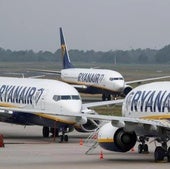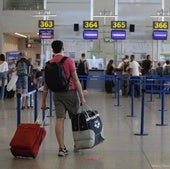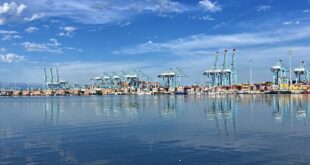Monday, 20th January 2025 at 14:52
Aena, Aeropuertos Españoles y Navegación Aérea, is the public company that manages 46 airports and two heliports in Spain and it has responded publicly to Ryanair to deny the Irish low-cost airline’s claims about the way it operates in Spain.
Ryanair, according to the sister publication Ideal of SUR, published on Saturday, 18 January, has said that it doesn’t fly from Granada due to airport fees. The Irish airline has thus directly addressed Aena, which it accuses of mismanagement at regional airports in Spain.
Aena responded immediately to Ryanair claims. Aena’s response to Ryanair’s claims was immediate.
Aena is responsible for the financing and making of investments in Spanish airports. Aena’s tariffs for airports and its commercial incentives paid to airlines are therefore public and transparent.
Aena announced that at the end of 2024 it had approved a specific commercial incentive that would be paid by the state-owned firm for 17 regional airports that did not recover their pre-pandemic levels. The new incentive was a 100% discount for airlines on airport security, and PRM (passengers who have reduced mobility), for any additional passengers in comparison to 2023.
The statement stated that this incentive was an addition to the existing commercial incentive approved for the period of 2024-2026 by Aena, which is a 100% discount for airlines on all passenger fares for additional passengers, for each airline, in relation to passengers during the equivalent season in the year 2023.
Aena has categorically stated, that at regional airports where Ryanair targets, the Aena commercial incentive, which is available to all airlines reduces the actual airport charges paid by any airline by around two euros each passenger.
Aena’s criticism of Ryanair is categorical: “Despite its grandiloquent speech, Ryanair’s goal with its constant public “pressing” is simple: To use a large portion of Spanish airports free of charge, which would threaten the financial viability of Spanish airports, whose operation is currently considered by experts as an example of good management on a global scale.”
Aena claimed that Ryanair intended to transfer income, namely, the money of Aena’s investors – all Spanish nationals, since the Spanish government owns 51 percent of the company. – into the pockets and accounts of the airline’s managers and shareholders.
Aena ended with the following: “We cordially ask Ryanair not to continue its mendacious, aggressive, and threatening communication and business strategy which is unfortunately well-known and inveterate. It’s very hard to avoid interpreting this as blackmailing Aena and the Spanish public.”
 Costa News Spain Breaking News | English News in Spain.
Costa News Spain Breaking News | English News in Spain.







